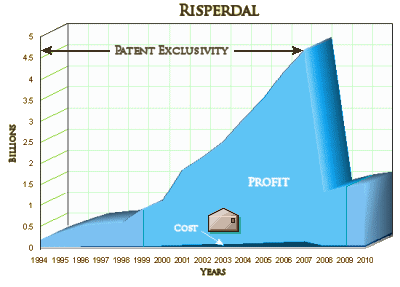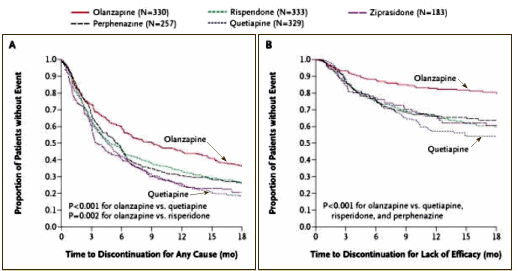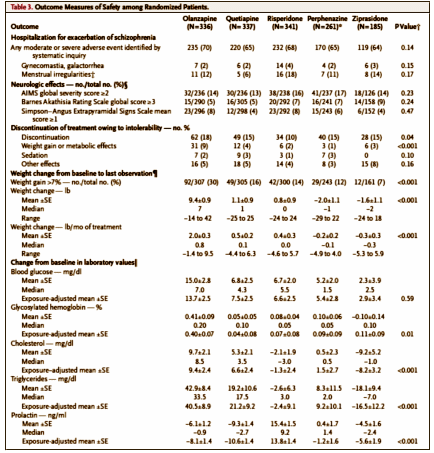What did CATIE tell us that we didn’t already know? It came out in 2005, a month shy of the advertised five years from the approval of the grant. By that time, it was apparent to anyone who looked very hard that the Atypical Antipsychotics weren’t exactly the wonder drugs they were advertised to be, and yet they were selling like hot cakes [and still are]:



CATIE may have put a dent in the Zyprexa sales [though it’s equally possible that the side effects and the suits may have taken their toll]. By the time CATIE came out, it looks as if the inertia was set. What CATIE told us is what we should’ve known all along. As I’ve found every time I’ve looked, the pharmaceutical companies engaged in a creative pantheon of deceptions, including but not limited to hiding anything they didn’t find fitting their marketing plans. And the ones I’ve reported on are just the ones I can see. Reading Judge Couch’s South Carolina Penalty Order points to some bigger sins in the Risperdal story than I’ve been able to find. And the deceptions are industry-wide.

CATIE says that with the exception of Zyprexa, the Atypicals are no more effective than the older drugs. That was apparent in the Seroquel Trial 15, in Zyprexa Trials HGAD and HGAJ, and Risperidal INT-6. CATIE says that the EPS are as common and as severe. CATIE says these three drugs cause weight gain, particularly Zyprexa. That was apparent to these companies before the drugs were approved. If these drugs are better tolerated, the patients didn’t seem to notice. And they all have withdrawal syndromes. CATIE says we were sold a bill of goods, and bought it hook, line, and sinker.

And where are the algorithms now? Osser’s Harvard site has no algorithm at all for Schizophrenia., though he did give a presentation at the APA this year. The IPAP site hasn’t been updated in years. It has some comments about CATIE which make little sense to me. TMAP has disappeared from view. It can only be found using the Wayback Machine [link] – its leaders now scattered across the globe [Rush is in Singapore, Shon is in Nevada raising odd looking cats, Chiles is in Washington State and owns (owned) a Vineyard].
For twenty-five years, the attention of academic and organized psychiatry has focused on future discoveries in Brain science, but the horizon looks arid. With a track record like the one with the Antidepressants and the Atypicals, it’s hopefully unlikely that the pharmaceutical industry will be able to pull off another round of weak sister drugs masquerading as blockbuster discoveries. And Psychiatry as a specialty has placed most all of its eggs in the Brain basket [with a determined vengeance], but it’s unlikely that the kind of studies chronicled in the pages of this blog are going to be future examples of evidence-based or measurement-based medicine on parade. I don’t think that the period of our shame is over even now. The recent court cases over Risperdal in South Carolina and Louisiana were based on conscious duplicity in advertising. The coming court case in Texas [recently postponed until November] is a much bigger case. J&J is accused of actively manipulating a State system through officials of the State of Texas and its Medical Universities resulting in huge profits for their company. And it opens up the question of similar activity by other companies and in other States. If this suit is like the ones before, discovery access to company records will likely be full of embarrassing surprises. Unfortunately, each case so far has made psychiatry look worse and worse. And the Texas case involves a number of psychiatrists in high places. We already know that it’s a conflict of interest nightmare. I suspect we’ll learn, as we have in the other suits, that there’s more than simply the appearance of conflict of interest – the pharmaceutical interests were right there, front and center.
On impulse, I looked at the program for the recent American Psychiatric Association Meetings in Hawaii and searched for "conflict of interest", "speaker bureau", "pharmaceutical", "drug company", "ghost writing", "propublica", "tmap" – all came up empty. "Algorithms" found the two presentations by Dr. Osser, otherwise nada. PubMed has 6 entries for conflict of interest[Title]) AND psychiatry[Title] – only three from the US [and three about the US]. I find these absences discouraging. For organized psychiatry to avoid self reflection in the face of so many clear indicators of a systemic epidemic of ethical infraction bodes poorly for our future. Even though psychological formulations are currently out of vogue, a couple come to mind [not from psychoanalysis but from the 12 Step Programs], "We’re ignoring the elephant in the room." and "You’re Only As Sick As Your Secrets". CATIE exposed the obvious and the truth was welcome, but the energy to find out why we didn’t have it in the first place hasn’t come from within the ranks of our leadership, the pages of our journals, nor from discussions at our meetings.
Afterthought:
One of those articles from PubMed shows the state of the art in 2005 [Industry Sponsorship and Financial Conflict of Interest in the Reporting of Clinical Trials in Psychiatry]:

It leaves nothing to doubt. And ironically, these are the acknowledgements for that article:

You have one of the very best psychiatric blogs on the internet. It is in a class with Neuroskeptic, Neurocritic, Health Care Renewal and a couple of others. It is an elite club.
But I have one major beef with you. You apologize WAY, WAY, WAY too much about your psychoanalytic roots and training. Yes, psychoanalysis over reached badly as far as models of severe mental illness; yes psychoanalysts kept people in treatment way too long to collect insurance payments. But the same is true of biological psychiatry and psychiatrists. There has been rank corruption on both sides. I still value (and use) in my clinical practice many useful insights offered by Freud and his successors. Especially as to what we now term “Axis II issues” as related to depression, anxiety, conversion, and the like. I am proud of my training. I use it everyday. Stop apologizing. No one school of psychiatry has the corner on the market as to human suffering. Frankly, one of your best posts was your depression article and how you intervened with that depressed woman at the clinic (see a few posts ago). Just my humble two cents.
A sad afternote to the CATIE trial is the CAFE trial run by the same principal investigators. CAFE was an outright experimercial that lacked a meaningful scientific justification. It was one of those Coke versus Pepsi studies comparing quetiapine (Seroquel) with olanzapine (Zyprexa) and risperidone (Risperdal). CAFE is an acronym for Comparison of Atypicals in First Episode psychosis. Even though the first generation antipsychotic drug perphenazine did as well as the atypical drugs in CATIE, it was not included in CAFE. And who was the sponsor? AstraZeneca, the maker of Seroquel.
You can find a lot more discussion and comments on Dan Carlat’s blog of August 26, 2010.
What does this tell us about the prominent academic investigators? Whose bread I eat, his song I sing.
Tom,
Thanks for that. I have no apologies for my psychoanalytic training or practice. But you’re right, I do feel apologetic for those who didn’t realize the consequences of people using their third party coverage to pay for it. They created, I think without much thought, a crack in the door that had disastrous consequences. In those days, I was a candidate, fully insured, but I never filed a claim. If I could see the reason back then, it should have been universally obvious.
I too use that training every day. And I still teach it at our Institute in retirement. I can’t imagine an alternative. But as a supervisor once told me, “You have four identities: Person, Doctor, Psychiatrist, then Psychoanalyst – in that order.”
Right now, I think Psychiatry has lost its way. No applied science is defined by its methods or theories. It’s defined by its object of study. Psychoanalysis is the study of the human private mental life. Psychiatry is the study of mental disease – “dis-ease.” And the notion that psychiatry is “clinical neuroscience” [Insel] is so far off the mark for a clinical specialty that I obviously can’t stop talking about it.
That said, I appreciate your comment. It’s not one we hear very often these days.
Barney,
CAFE was “more of the same” from my perspective – what you’ve appropriately called an “experimercial.” It should’ve been in a detail man’s glossy handout, not in our literature. CATIE restores some of my faith in our NIMH [unlike its parallel, STAR*D]. Beware of “prominent academic investigators” bearing gifts.
CAFE stands as a testament to the “modern problem.” Its only reason for being was to neutralize CATIE for business purposes.
Please do keep talking about anything you want to talk about!
But the study of “human private mental life” and “mental dis-ease” sometimes intersect and, I would submit, are sometimes necessary for a full understanding of the dynamics and, yes, mechanisms, of mental disorder. Not so much (if at all) for the major disorders like schizophrenia or bipolar disorder (especially bipolar 1) or melancholic depression. These disorders are primarily biologically-driven with “psychology” as a triggering factor or merely a facet of understanding treatment compliance and non-compliance. But psychodynamic psychiatry and psychology have much to offer as far as understanding the intrapersonal, interpersonal, and intrapsychic (e.g. motivational and “appetitive” ) contributions/bases of less severe depressive states, adjustment reactions, anxiety, relational dysfunction, somatoform disorders, and personality disorders– a large sector of human suffering that psychiatrists are mandated to treat., and should treat. Maybe that depressed woman with the philandering father you saw in the clinic was “cured” by Celexa. But maybe your questions about her developmental history, your INTEREST about her relational patterns, and your informed understanding of her psychodymanic relational pattern, which led to your more healthy suggestion of where she might meet potential suitors, may promote some self-development such that she may be less vulnerable to depressive episodes in the future (with better relational choices). But this is a facet of psychiatry that is no longer taught in most academic medical departments; we are in the age of “person = neuroscience” and that’s about all. And that is sad.
I’m interested in learning more about the research issues discussed here, and would like to know how I can arrange to interview or correspond directly with the author of this well-informed blog.